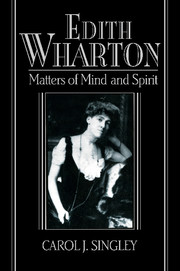1 - Priestess of Reason
Published online by Cambridge University Press: 06 August 2010
Summary
I was a failure in Boston … because they thought I was too fashionable to be intelligent, and a failure in New York because they were afraid I was too intelligent to be fashionable.
Edith Wharton, A Backward GlanceDiscoveries in science, which played key roles in the late Victorian struggle with faith, are crucial to understanding Edith Wharton's religious choices. Especially important is her effort to develop her intelligence and claim a role for herself, as female, in the world of ideas and art. Wharton's intellectualism, impressive by any measure, was astounding for a nineteenth-century woman with no formal education. Wharton placed great importance on learning and strove to develop her innate intelligence through reading, writing, and conversation. Her keen rationality helped to unlock doors to philosophy, theology, and metaphysics, thus deepening the possibilities for her spiritual inquiry. At the same time, her intelligence also competed at various points in her life with her ability to suspend judgment and accept on the basis of faith alone.
Especially early in her life, Wharton resisted religious teachings because they omitted the important faculty of reason. As the philosopher Vivaldi explains in the novel The Valley of Decision (1902): “against reason the fabric of theological doctrine cannot long hold out.… We have not joined the great army of truth to waste our time in vain disputations over metaphysical subtleties” (1: 154).
- Type
- Chapter
- Information
- Edith WhartonMatters of Mind and Spirit, pp. 41 - 66Publisher: Cambridge University PressPrint publication year: 1995

